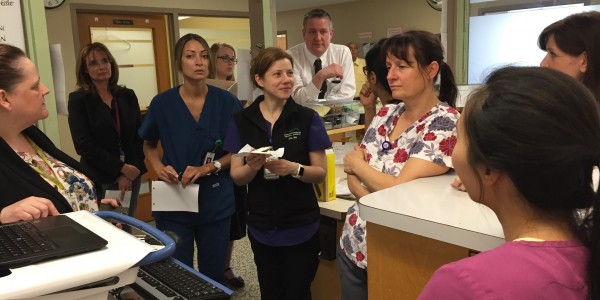LGH and Sea-to-Sky sites get a glimpse of the future
A team of VCH-Coastal leaders and Clinical and Systems Transformation (CST) project team members went on the road recently to deliver a sneak peak at the future of health care, stopping in at Lions Gate Hospital campus, Squamish General Hospital, Pemberton Health Care Centre and Whistler Health Care Centre.
Each event featured a demo of an early prototype of the new clinical information system followed by an opportunity for staff and physicians to ask questions.
For many, it was their first opportunity to learn about how CST will improve the quality, safety and consistency of patient care through the establishment of common clinical standards – supported by a new shared clinical information system.
Staff and physicians also learned about the support available as part of the ongoing implementation process, leading up to the activation of VCH-Coastal sites in spring 2017. Official implementation kickoff events are planned for September 2016.
Thank you to everyone who took the time to participate in these preview events – your participation and support are essential to our success. To learn more about CST, visit CSTproject.ca or email info@CSTproject.ca
Here are answers to three of the most commonly asked questions that were asked at the preview events:
What support and training will be provided?
The CST implementation teams are putting comprehensive readiness plans in place to support staff and physicians. Education will be based on different patient scenarios (workflows), as well as role and specialty. There will be lots of opportunities to practice on the new clinical information system in a variety of settings. Recognizing that each learner has unique experiences and learning needs, a blended learning model is being developed, including:
- face-to-face education sessions
- practice with the system
- online learning
Peer support will be available before, during and after training has finished via super user, peer mentors and adoption coaches, including at-the-elbow support when needed.
What about devices?
A variety of mobile devices, including workstations on wheels (WOWs) and medication carts, have been evaluated for use with the new clinical information system. The device and workflow teams will be collaborating with local unit level clinicians to ensure selected devices suit the access and workflow requirements at each site and for each specialty.
What will happen if/when the system goes down?
To ensure continuity of care during planned or unexpected downtime, staff and physicians will have access to a view-only copy of the electronic patient record using a specialized downtime viewer. These records will be available to view and print from computers on the unit and other locations at each site. There will be a comprehensive plan for both planned downtime (required for system upgrades) and unplanned downtimes (for unlikely emergencies, such as a system-wide failure). The plan will include a downtime preparedness check-list and the step-by-step processes to follow during downtime.

